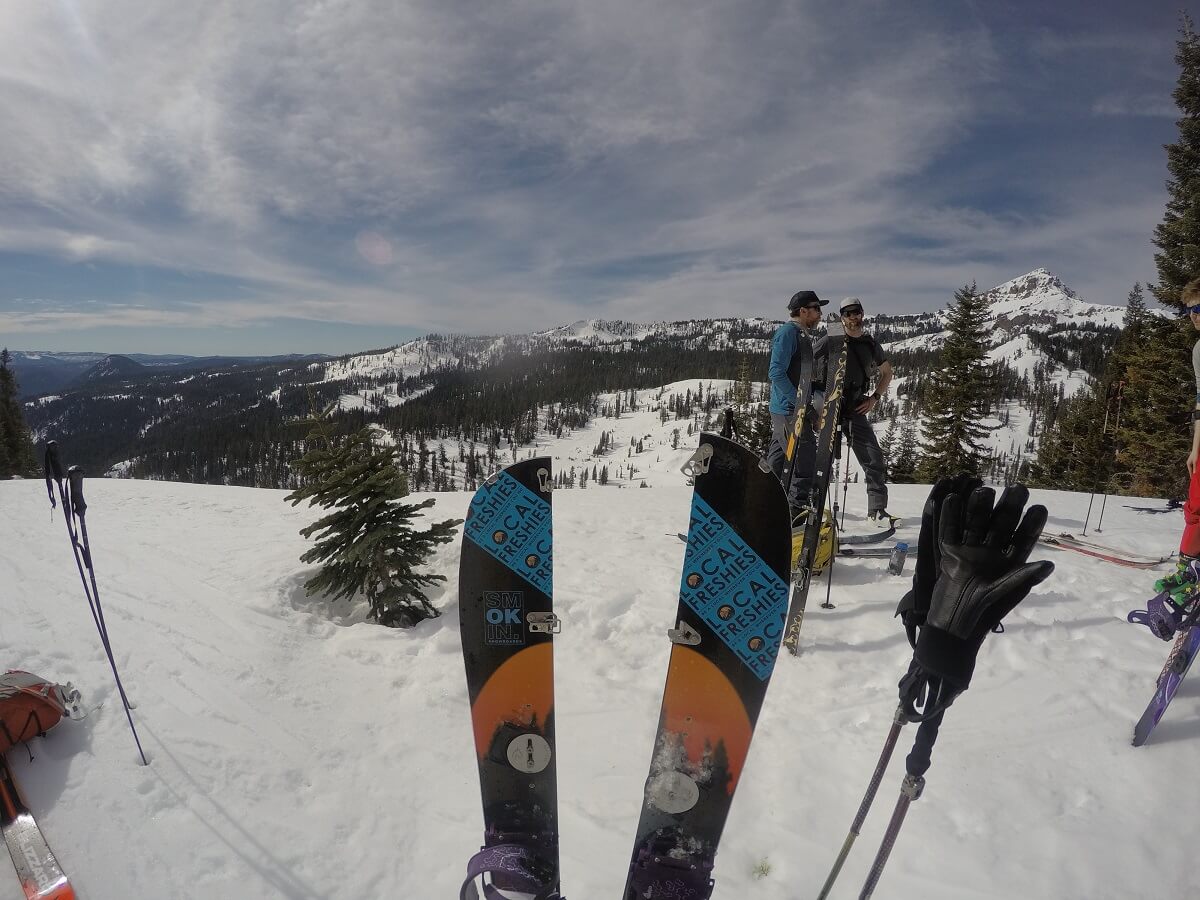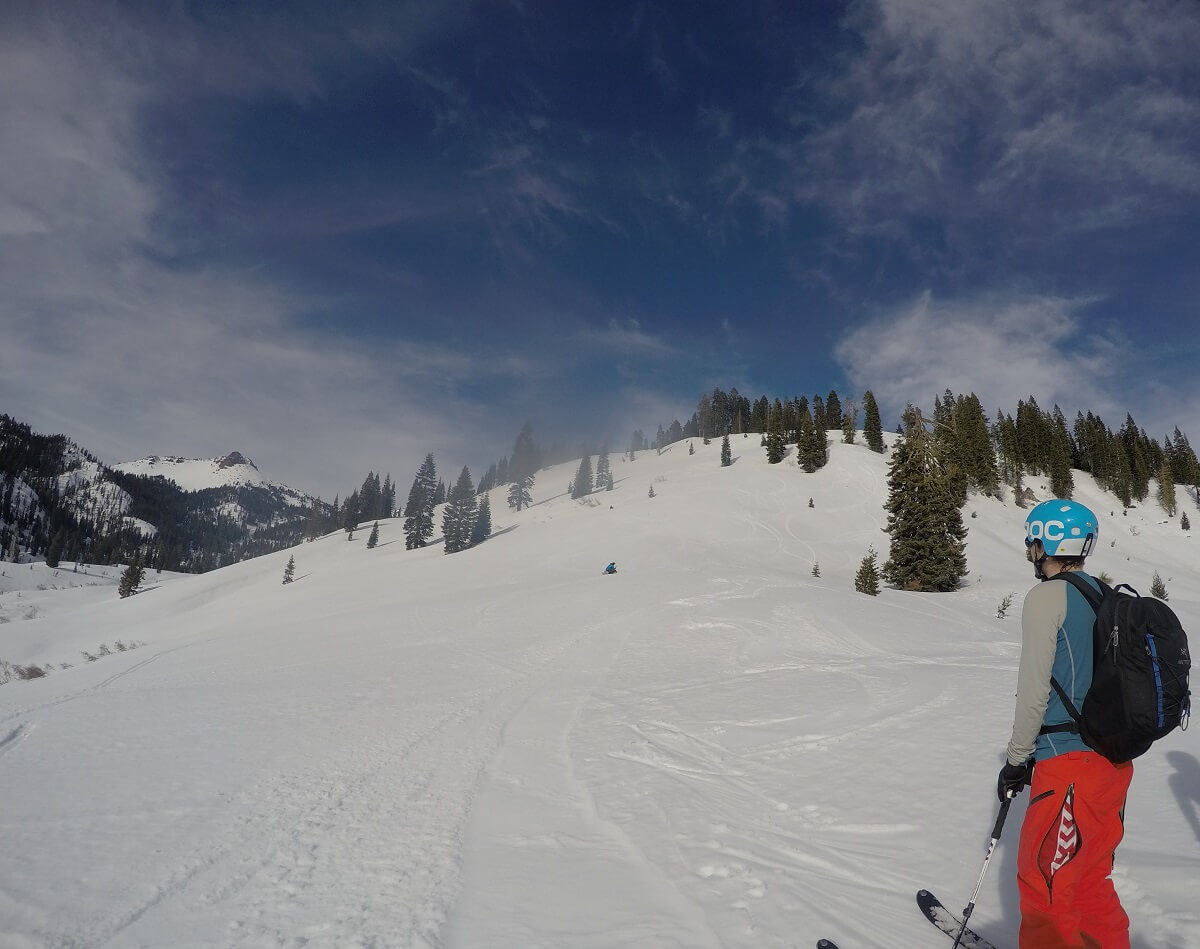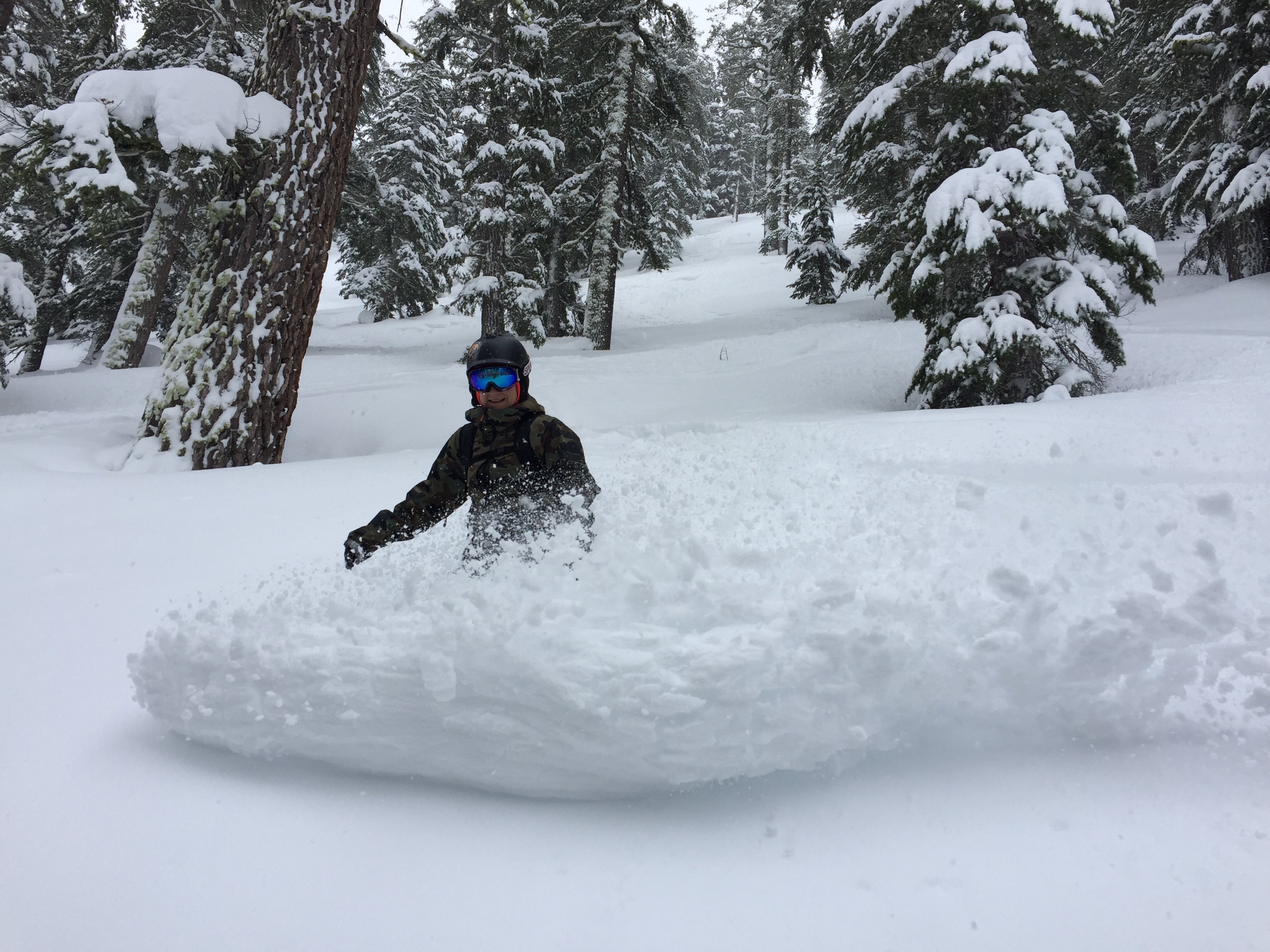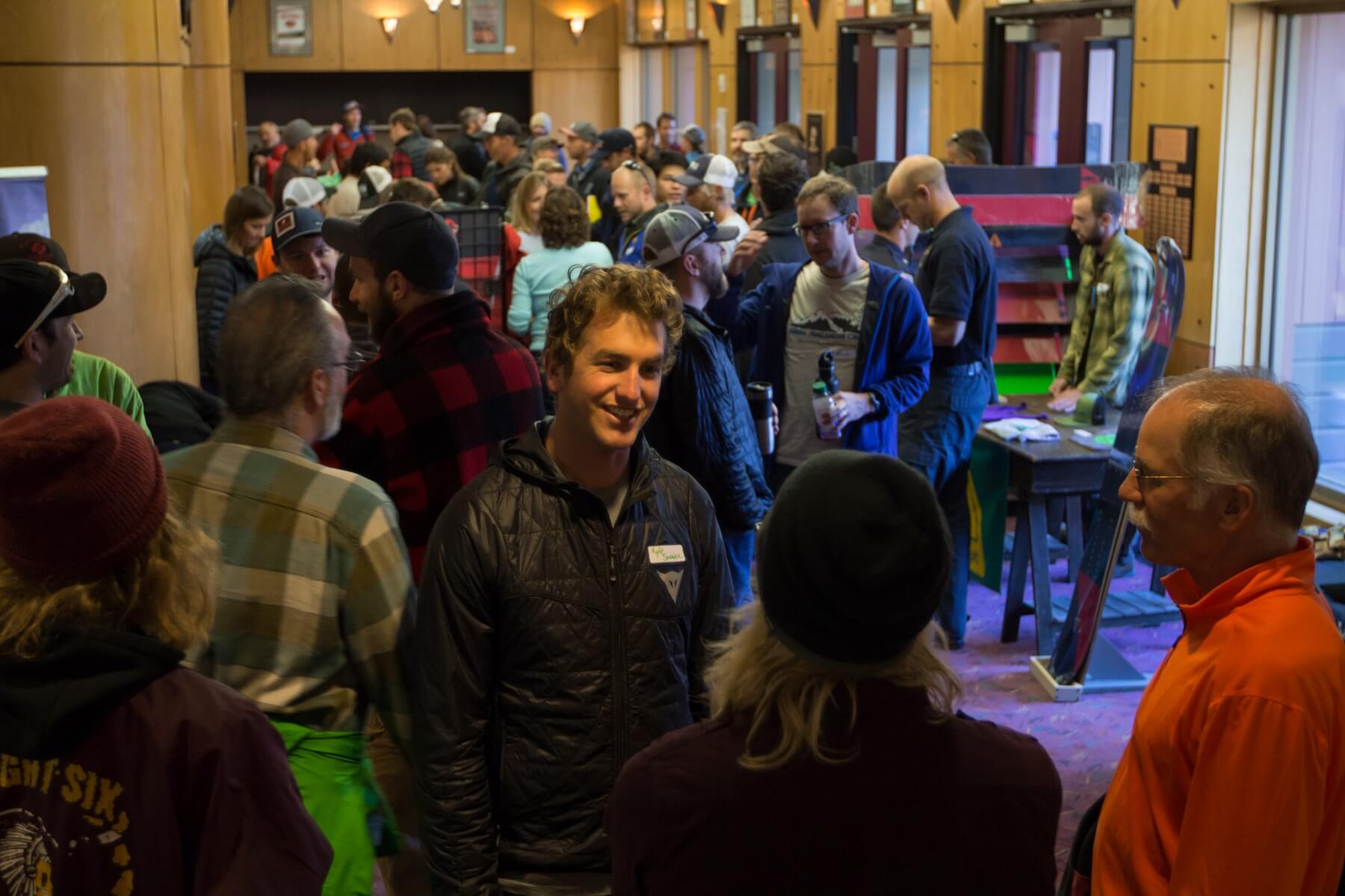My first backcountry tour was one of the most terrifying and eye-opening experiences I’ve EVER had in my life. It was a rude wake-up call. It raised the question, “Even with avalanche training, how well prepared are you when things go sideways?” Besides avalanche training, EMT certification is something ALL of us should have not just for skiing but for heading out into the wilderness be it hiking, biking or even camping. Luckily in the end, it was a great learning experience for everyone involved.
Note: All the student’s names in this article have been changed to protect everyone’s identity.
The Final Descent Is Oh So Sweet

After three full days of intense learning, it was finally time to hit the slopes. The next question was what run should we do: “Movie Screen” or the “Glades?” Some raised concerns about “Movie Screen” being too steep, so as a group we decided to split up—radios in hand and snow conditions relatively safe. Our group chose to drop into the “Movie Screen.”
Turn after sweet turn of glorious corn was gobbled up, slashing our way down the perfectly pitched face. High fives all around at the bottom, then a short hike to the next descent point, about a thousand yards away. We regrouped, and one by one, dropped into the final face. The snow here was thicker and stickier than at the top, a sign we were a little too late that day.
It’s No Longer A Drill… This Is Real!!!!
Everyone was waiting at the bottom, except for Sean, our tail gunner and the last person in the group. Suddenly, over the radio, we hear a calm Sean say, “Um, we’ve got an emergency.” At first, we all thought, “Are you kidding me, another drill? We’re exhausted and just want to go home.” But then, with a solemn expression, Richard confirmed: this was no drill. It was real.
Richard gave everyone the option to leave, since some of us had work commitments to get to. But after a brief look around, the whole team agreed that the right thing to do was stay and help.
We stared up at the massive hill we had just skied and sighed. We began the climb back up to Sean and Mary. As we trudged up, the group quickly turned to chaos. Some went straight up, while others zigzagged in every direction.
Broken Leg??? Real-life Backcountry Emergency
 As we reached Sean and Mary, our worst fears were confirmed—she had broken her leg. We were so close to finishing up our weekend backcountry tour and heading home, yet we were still so far. Only a mile from the Visitor Center, we could see the building, but it might as well have been in Antarctica. With a team member injured, getting out was going to be a challenge.
As we reached Sean and Mary, our worst fears were confirmed—she had broken her leg. We were so close to finishing up our weekend backcountry tour and heading home, yet we were still so far. Only a mile from the Visitor Center, we could see the building, but it might as well have been in Antarctica. With a team member injured, getting out was going to be a challenge.
What were our options? Fortunately, Richard and Sean were prepared. Richard decided to ski out and speak with the on-duty National Park Ranger to see if we could get a sled, while Sean stayed behind to stabilize Mary.
While we waited, we tried to comfort Mary with jokes and kept her warm. About an hour later, we received confirmation that a Ranger would snowshoe up with a sled so we could ski out with our injured team member. Two volunteers immediately offered to meet the Ranger halfway to help carry the sled back.
What the Heck is a Dead Man’s Anchor?
While we waited for the sled, we began to set up a dead man’s anchor to help lower it safely to where Mary was lying. Most of us stared at Sean when he mentioned those words. “What the heck is a dead man’s anchor?”
We come to find out that it’s when you bury a pair of skis, tied with a rope, deep in the snow to ensure the sled doesn’t slip away as we lower it down. Wow! All I could think about was how unprepared I really was for this backcountry tour.
Over the radio, we heard Richard asking if we should call for a helicopter. With the sun setting, time was of the essence. Soon after, we received confirmation that a helicopter was on its way.
Woop, Woop, Woop – A Helicopter Approaches
Before we could see it, we could hear the helicopter approaching—woop, woop, woop. The sound echoed off the surrounding peaks. In the distance, a small speck appeared, growing larger until we could clearly see it was the helicopter. It made a large swoop over us but didn’t even attempt to land. Our hearts sank. The pilot was uncomfortable landing on the side of the mountain.
“What are we Going to do?”
Over the radio, we heard that the California Highway Patrol had another helicopter in the area and could attempt a rescue. We watched as another helicopter approached. Hovering just 50 feet above us, they lowered a basket to Mary and helped load her in. As they slowly ascended from the side of the peak, she dangled hundreds of feet off the ground as they flew her out. They safely landed at the Visitor Center, where she was transferred inside the other helicopter for the ride to the hospital.
With Darkness Coming We Need To Move Quickly
As we wave our goodbyes, we notice the sunlight is quickly fading. Both Sean and Richard shout for all of us to pack up and gear up fast. Darkness in the backcountry is very different from at home. Once it’s dark, everything becomes a bigger challenge.
Geared up with lanterns on our heads, we slowly snowboard down the cat track. In the moonlight, we skin the rest of the way down to the parking lot. The plan had been to leave by 3:00 p.m., but when an emergency happens on a backcountry tour, your 9-to-5 life takes a back seat to safely getting out.
Was It Worth It?

In the end, this class couldn’t have been a better learning experience. It taught us a ton about avalanche safety, but the real danger isn’t just avalanches… it’s the backcountry as a whole. Besides understanding the snowpack, it’s a good idea to take a Wilderness and Remote First Aid Course as well. Sean’s words continue to ring in my ears to this day, “Hope for the best and prepare for the worst.” This is something all of us should consider when playing in a place as dangerous as the woods. And, it’s always a good idea to be surrounded by individuals that are calm and collected.
If you want to learn how to get started, find out what gear you’ll need, or hear about our personal experiences like this one, head over to our comprehensive backcountry guide: All Things Splitboarding & Backcountry Skiing.











Why are there no writings about her bindings and her settings?
I’m the only bona fide binding engineer in North America (including all types) — and would be happy to provide your group with a pro bono analysis for your use to publish with your own edits / or, keep it confidential. I seek no mention of my name: that’s up to you.
Prevention — for you and for others, next time — is a far better approach, compared with what you and your readers might go through next time in the absence of addressing the root of the bindings/settings issue(s).
( All types of tibia fractures are binding/settings related. Let’s get to the root of exactly what the binding/settings issue is. )
Hey Rick,
Great questions. This happened YEARS ago and honestly didn’t even think about asking those questions. Moving forward I’ll be sure to keep that in mind in future ski touring endeavors.
– Alex
I now pack a splint in my pack – from wilderness first aid training (also little antiseptic packets, and some gauze, tape, and elastic roll bandages.